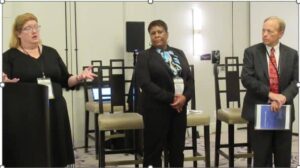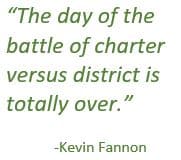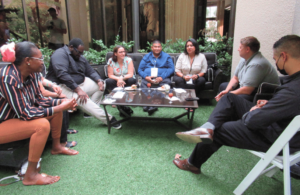Skill Building and Network Building Among Highlights of CCAP’s
California Charter School Authorizers Conference
Everyone needs and deserves a refresher now and then, and CCAP’s California Charter School Authorizers Conference fit the bill for more than 120 authorizers, charter school leaders and board members, principals and superintendents, and state education leaders.
They gathered in Costa Mesa in July, representing rural, suburban, and urban regions of California, and hailing from the smallest to the largest charter authorizers in the state.

Charter School Authorizing 101-Preconference Workshop: (left to right) Dr. Michelle Johnson, Associate Director, Charter Schools Department, Santa Clara County Office of Education (SCCOE); Mefula Fairley, Director, Charter Schools Department, SCCOE; and Dr. David Patterson, CCAP Board President
About a third of them arrived a day early for “Charter School Authorizing 101,” a full-day preconference workshop for new authorizers and those looking to sharpen their skills. The session is one of many training and network building opportunities sponsored by the Charter Authorizer Support Initiative* (CASI), a subgrant awarded by the California Department of Education to CCAP and the Santa Clara County Office of Education.
At a reception following the workshop, Jeff Schmidt, Coordinator for District Improvement and Supports in the San Mateo County Office of Education declared that the program exceeded his expectations. “I wanted to come here to the preconference today to learn basically what I don’t know. I don’t know what I don’t know,” said Schmidt with a quick laugh.
Before the conference, Schmidt figured he was a five on a 10-point scale of general knowledge about authorization, but after learning so much at Charter School Authorizing 101, he revised that estimate—downward. “Now, I would go back and say it was probably more a three, and now I’m pushing seven. I hope to get to 8½ by the time this conference is over.”
Other in-depth sessions led participants through a hands-on practice of reviewing new charter petitions and provided checklists of what effective financial oversight looks like and, conversely, what signs may indicate fiscal distress.
Kevin Fannon, a former San Diego County Deputy District Attorney, gave an engrossing presentation of missed red flags in charter school finance in his account of what went wrong—and lessons learned—in the A3 Charter School scandal. One of the largest fraud cases in the country involving public education, A3 involved a charter organization operating out of San Diego County that stole more than $250 million in taxpayer funds earmarked for charter school students, by misleading small authorizers across the state into being part of their network.

Kevin Fannon, former San Diego County Deputy District Attorney
“CCAP, I know, is trying to make authorizing practiced more consistently. We think oversight is practiced very inconsistently. Every district has a different oversight procedure,” observed Fannon. One step toward improving oversight, he added, is through rethinking the relationship between charters and authorizers to improve communication and build collaboration. “The day of the battle of charter versus district is just totally over. I think it’s much better to be part of it so you can prevent things from happening, rather than after the fact.”
Discussions of new laws and regulations; hot topics, such as oversight challenges with hybrid and nonclassroom-based schools; and meeting the needs of English learners and students with special needs also drew a great deal of interest and feedback.
 “Today was a ten out of ten,” extolled Jason Murphy, the Director of Research & Accountability for the Stockton Unified School District, which sent eight people to the conference. “Our team came to learn more about charter oversight. We were really pleased with the level of detail, not just on explaining how the different laws are being applied, the new laws, but just hearing the practical experience from different authorizers and how we could take their practitioner wisdom and apply that.”
“Today was a ten out of ten,” extolled Jason Murphy, the Director of Research & Accountability for the Stockton Unified School District, which sent eight people to the conference. “Our team came to learn more about charter oversight. We were really pleased with the level of detail, not just on explaining how the different laws are being applied, the new laws, but just hearing the practical experience from different authorizers and how we could take their practitioner wisdom and apply that.”

Stockton Unified School District sent eight authorizing staff to the conference
Authorizers, especially in small and rural districts, which generally have fewer staff, less experience with charter schools and less time to devote to charter oversight, were especially pleased to connect with other authorizers across the state.
“I think it’s really important because especially in a small school district, you are by yourself, and it can be hard to meet people,” said Dawn Carl, Superintendent/Principal of the 2,424-student Winship-Robbins Elementary School District in Sutter County, (that figure includes 2,311 students who are enrolled in Feather River Charter, a homeschooling charter serving students in Sutter County and surrounding counties). “And I think when we do things like this, we learn from each other.”

Dawn Carl, Winship-Robbins Elementary School District
But even authorizers in large, urban districts said everyone benefits from connecting with peers, no matter the size. Many, like Kelly Krag-Arnold, Director of Charter Schools for Oakland Unified School District, also savored the opportunity to meet in person.
“There’s a limit to zoom,” said Krag-Arnold, “and this is nice to actually build the foundations for relationships so that we can reach out in the future when we have random things that come up. We really feel that we know who’s doing this work elsewhere.”
As important as it is to build working, even collaborative relationships, Dawn Carl said she gained something unexpected from the conference sessions and conversations with other authorizers—she needs to fit in a few more items to her schedule. “Today I made a to-do list, and I added seven things to my to-do list, but they’re things that need to be done that I didn’t realize needed to be done, so it was really good.
CCAP gratefully acknowledges the generous support of the conference from the Charles and Helen Schwab Foundation, the California Department of Education, and the U.S. Department of Education.

